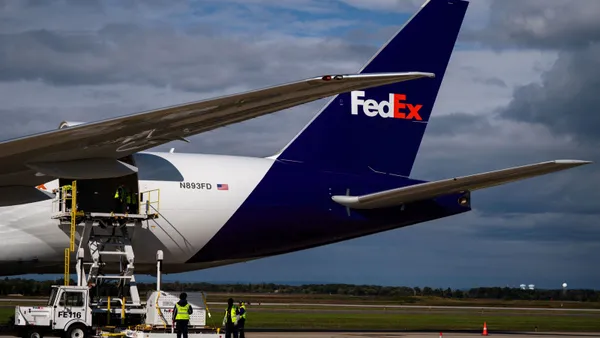Dive Brief:
- Federal officials cleared the way last week for implementation of Rhode Island's controversial law to institute Class 8 truck-only tolls to fund road and bridge repairs, and logistics companies are not happy, the Commercial Carrier Journal reports.
- Despite their opposition to the move, the American Trucking Associations sent a letter to the state inquiring how officials intend to ensure truckers continue to have access to local communities despite the new travel restrictions, and whether the state has considered secondary effects such as loss of trucker-business and how to enforce the new law.
- The letter is part of an ongoing battle, so far lost, by the trucking industry to attempt to delay or rebuke the law since the toll places an unbalanced burden on the logistics industry for state infrastructure projects. The state infrastructure act not only suggests a $3 trucks only toll, but also proposes removing tolls for other motor vehicles later by the ballot.
Dive Insight:
Federal approval of the truck-only toll reveals a concerning trend in the transportation sector: infrastructure needs are rising without similar levels of federal investment, so legislators are increasingly looking to devise ways to up the private sector's contribution to road repairs.
This story may be taking place in Rhode Island, but the conversation over appropriate methods to fund infrastructure is taking place at a national level. Politico's Morning Transportation reports legislators are considering replacing the gas tax with a miles traveled tax, despite opposition by the ATA and other interest groups. A miles traveled tax, just as a truck-only tax, places the burden of infrastructure renewals on those using the roads most often, and therefore those who degrade it most.
As a result, trucking agencies are shifting their strategy, at least in Rhode Island. Rather than focusing on the legal issues of taxing a specific sector and class of citizens, the ATA is now looking to highlight the effects on the overall economy. Highway communities still exist, and truckers help sustain countless jobs at service stations and roadside restaurants, among others. In boycott or for cost-saving measures, trucking companies may reroute away from traveling through the state when possible, affecting the service economy.
Rhode Island remains a small state, but the precedent and federal approval is worrisome as it may push other states to consider similar measures, which could have a larger impact on logistics prices.













